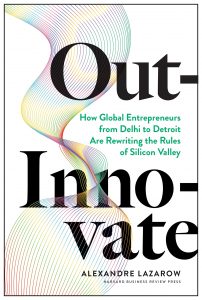Startups have changed the world. In the United States, many startups, such as Tesla, Apple, and Amazon, have become household names. The economic value of startups has doubled since 1992 and is projected to double again in the next fifteen years.
As venture capitalist Alexandre Lazarow shows in this insightful and instructive book, this Silicon Valley ‘gospel’ is due for a refresh–and it comes from what he calls the ‘frontier,’ the growing constellation of startup ecosystems, outside of the Valley and other major economic centers, that now stretches across the globe. The frontier is a truly different world where startups often must cope with political or economic instability and lack of infrastructure, and where there might be little or no access to angel investors, venture capitalists, or experienced employee pools.
Here’s a glimpse into some of these insights for all you future entrepreneurs!
Learn from the microfinance industry
‘In [the industry’s] early days, a key insight was that the poor were creditworthy borrowers. By placing borrowers into groups with a sense of strong social accountability and shared responsibility on the loans’ repayment, microfi nance lenders found that repayment rates were high.
But this insight was also the biggest challenge: the in-person nature of putting people in groups, making regular visits to collect money, and maintaining deep customer engagement is expensive. Companies like Tala, Branch International, and Safaricom’s own M-Shwari now offer consumer loans, relying entirely on the mobile money platform.’

Create rather than disrupt
‘Timbo Drayson founded OkHi, a technology-driven startup that creates addresses where there are none. OkHi’s mission statement is “Be Included.”
Creators do three fundamental things simultaneously. First, they offer a product or service that solves an unserved, acute pain point in the formal economy. Second, Creators offer a solution for the mass market. Finally, Creators are focused on game-changing innovations that fundamentally rethink a market and a sector.’
Raise a camel, not a unicorn
‘The growth-at-all-cost model simply does not translate to the realities of the Frontier. Instead of the unicorn, then, I propose the camel as the more appropriate mascot. Camels live in and adapt to multiple climates. They can survive without food or water for months. Their humps, primarily composed of fat, protect them from the desert’s scorching heat. When they do find water, they can rehydrate faster than any other animal.15 Camels are not imaginary creatures living in fictitious lands. They are resilient and can survive in the harshest places on earth.
Signing up for Silicon Valley’s unicorn-hunting strategy is a bit like mortgaging your home to buy three new homes. If things go well and the market moves in the right direction, then the rewards are massive. Facebook’s eye-watering returns for investors are a case in point. Yet this approach also increases the likelihood of losing everything.’
Build A-teams, don’t hire just A-players
‘…in Silicon Valley, companies and employees see their relationships as short-term affairs. Retention rates are among the lowest in the United States. More than 13 percent of staff turn over every year, and in certain job categories like user design, the rate is well above 20 percent, which translates to short employee tenure.
Frontier Innovators […] use fi ve key strategies to build and scale top teams. They test candidates for behavior and capabilities, develop a proprietary talent pipeline, leverage global distributed options, take a growth mindset to retention and training, and think critically about compensation and perks.’
Cross-pollinate
‘Frontier Innovators […] cross-pollinate. They leverage diverse lived experiences, often across multiple geographies, industries, and sectors, to build their businesses. They tap global networks for capital and resources.
At the Frontier, a typical innovator’s lived experience is longer and spans geographies, sectors, and industries. This diversity in experience explains the issues they choose to tackle and the unique approaches they employ.’
*-*
With rich and wide-ranging stories of frontier innovators from around the world, Out-Innovate is the new playbook for innovation–wherever it has the potential to happen.







